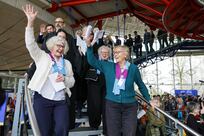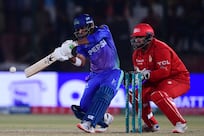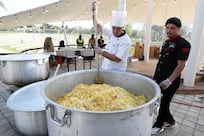As befitting a man who famously described the British press pack as "a diabolical lot", Tony Jacklin has never been an easy character to interview; cagey, taciturn and unresponsive - and that is on a good day. On a bad day...well, you would not wish to approach him with a notebook and pencil. But there are a few topics you can raise that generate a mellowing in those suspicious eyes; his inspired captaincy of the European Ryder Cup team that ended decades of American dominance at The Belfry in 1985... his victory in the British Open at Royal Lytham in 1969...and his soaring triumph in the US Open at Hazeltine, Minneapolis on June 21, 1970.
In the pre-Tiger Woods era, Jacklin's winning margin of seven strokes on the most fiendish 18 holes ever devised was a towering achievement, and he remains intensely proud that he was the first European to win the US Open since Irishman Ted Ray in 1920 and, indeed, the last to do so. "That was the best week of golf I ever had in my life," he sighs nostalgically. When asked how he found the course after his first round, Dave Hill, who would eventually finish runner-up to the 25-year-old Briton, growled: "I don't know...I'm still looking for it."
Accustomed to manicured fairways and immaculate greens, the American contingent regarded a boggy Hazeltine as a no-man's land whereas Jacklin, raised on the rain and wind-swept ploughed fields of 1960's Europe, "felt right at home". With the gale howling at 56kph, Jacklin birdied four of the first seven holes on his way to an opening round of one-under-par 71; golf's "Big Three" of Arnold Palmer, Gary Player and Jack Nicklaus came home in 79, 80 and 81.
Although it is Nicklaus's belief that the four Majors are the easiest titles to win "because 90 per cent of the players in the field don't believe they can", Jacklin was a troubled man at the start of the final afternoon even though successive rounds of 70 had left him sitting on a comfortable four-shot cushion. "When I was a kid, the son of a steelworker in Scunthorpe, my ambition was not just to be a great golfer but to be the very best golfer in the world. If I hadn't had that mindset, I couldn't have sustained the pressure involved in that last day at Hazeltine." When he proceeded to bogey the seventh and eighth to allow Hill to move within three shots, Jacklin could not hear the alarm bells above the noise of his knocking knees. "I thought, 'Cripes, what's going on here?'. I'd putted so beautifully all week. I knew that if I lost, I'd be branded the biggest choker of all time by the newspapers back home."
Faced with a 30ft birdie putt on the ninth and with the adrenalin pumping through his arms, Jacklin sent the ball charging at the hole like a locomotive; it might have been travelling yet had it not banged into the buffers that was the back of the cup, risen six inches in the air, then clanged cleanly into the hole. "Talk about luck. If the ball hadn't dropped then I'd have been left with another 30-footer for a par. But my confidence came roaring back, and the pressure just lifted. I thoroughly enjoyed the last nine.
"The most important thing about my victory at Hazletine was that it proved my win in the British Open had been no fluke. It's always been my contention that the winners of the Majors are the true champions, although, as I know only too well, sometimes luck may play a part. Quite naturally, after I'd won at Lytham, I entertained some thoughts about Lady Luck. But when I won the US Open all such thoughts immediately dissolved."
@Email:rphilip@thenational.ae




